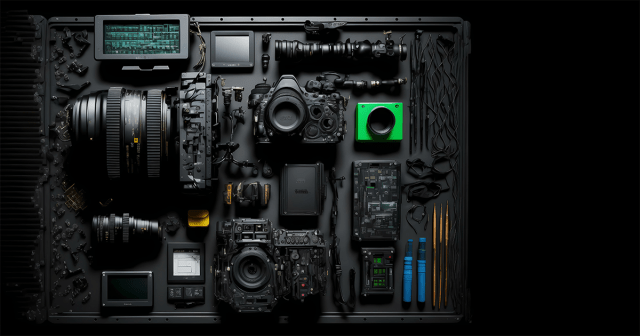
TL;DR
- ChatGPT poses a fundamental question about how artificial intelligence will transform the workforce behind all creative media.
- The reality is that AI is already a co-collaborator and that creatives will be using tools like Midjourney and ChatGPT to streamline their work, cut costs and iterate new work.
- Every time we feed an AI engine it gets better and better at mimicry, perhaps to the extent that one day it will be able to simulate the human lived experience.
READ MORE: ChatGPT: How AI Could Change Our Future (SMPTE)
There’s a legitimate concern that the majority of art, media, and content will be machine-generated sooner rather than later. But how likely is that reality?
“While ChatGPT [or chat-based Generative Pretrained Transformer] isn’t exactly Skynet, it does bring up some interesting questions about how it can benefit, or damage, society,” a SMPTE blog post suggests. “Many worry that creative industries, such as writing, content creation, and even art, will see major disruptions within the next few years.”
BuzzFeed, for example, is cutting 12% of its workforce and plans to use AI to develop content including personalized quizzes.
READ MORE: BuzzFeed to cut 12% of its workforce (CNBC)
READ MORE: BuzzFeed To Use ChatGPT’s AI For Content Creation, Stock Up 200%+ (Forbes)
As it stands today, these programs are far from perfect. Some information in a ChatGPT text might be inaccurate. SMPTE contends that everything from text to video is “extremely simple” when generated by an AI.
This makes generative AI tools good for writing emails, basic copy, or social posts, but they “can’t write a film script that holds any narrative weight since it lacks the capacity for nuance or subtext.”
SMPTE believes that AI programs will “probably” play a huge role in future when it comes to simple tasks but artists and other creatives “shouldn’t be concerned about losing their jobs anytime soon.”
Other commentators beg to differ. Peter Csathy, writing for Wrap PRO, says, “The potential impact of this technology is mind-boggling and should not be underestimated. It will transform all of our lives, including those of us in the arts.”
Take screenwriting. According to Csathy, who put ChatGPT through its paces, the AI text tool “writes a full, beautifully formatted script in seconds. And not just one, mind you. Endless iterations if that’s what we want,” he warns.
“Much to the pleasure of budget-constrained producers and studio bean counters, ChatGPT can churn and burn 24/7 with no union representation,” he adds.
What else? Well, AI has been used in VFX for years and its use will only increase.
How about music? Streaming service Anghami recently joined forces with AI music platform Mubert to enable users to create “unique soundtracks” for films and television using one million samples from over 4,000 musicians.
READ MORE: Anghami Partners with Leading Generative AI Music Platform Mubert to Fuel Football Fever with Personalized Cheers (Anghami)
“If we allow it, Mubert could take music cues from Danny Elfman’s film scores — not to mention the entire world of soundtracks — and compose entirely new ones in seconds,” notes Csathy. “Thousands of them.”
AI is already making huge inroads and advances in its capabilities are happening at pace.
“We are only at ChatGPT version 1. Just imagine versions 2 and 3. Or version 10 in the year 2030,” Csathy observes.
READ MORE: Chat GPT Proves That AI Could Be a Major Threat to Hollywood Creatives – and Not Just Below the Line (Wrap PRO)
The question is, what should creators do about it?
The consensus is that we have to learn to work with AI — not try to deny or ignore it. There is in fact a great deal of power in being human that a machine cannot (yet) replicate.
“Even when AI programs do get better at making content, the enjoyment of said content is extremely subjective,” reassures the SMPTE post. “Most people enjoy media that reflects their personal experiences or the experiences of others. Since these programs can’t have human experiences, they will always be one step behind human content creators.”
Matt Griffin, founder of the 311 Institute, explains how he and his 10-year-old son wrote and illustrated a book (a guide to professional runners, with proceeds to charity) in under a day. He explains in an interview for technology developer Arm’s Blueprint blog that it cost just $25 — rather than the $15,000 and the two to three month’s work it would normally have cost.
He thinks the technology is a double-edged sword.
“On the one hand, these technologies democratize access to skills for everybody. That means I can do new things faster, which is great for efficiency, but the artist that I would’ve employed that I no longer need to employ, that’s bad news for them.”
An AI technology developed by Futuri Media could streamline costs and help deliver targeted content for local radio broadcasters. Rogers in Canada and Alpha Media in the United States are beta testing RadioGPT.
READ MORE: The impact of AI tools: Q&A with futurist Matt Griffin (Arm Blueprint)
“It all starts with our monitoring of a local market,” Daniel Anstandig, founder and CEO of Futuri Media, explained during an episode of the NAB podcast. “We have a… system that looks at everything that’s trending on Facebook, Twitter, Instagram, and over 250,000 news sources. And then based on that, we can see what people are talking about or what they care about in a local market,” he said.
“We take that content and we use GPT-3 to create engaging, dynamic scripts that then we combine with our own back-end and other creative content to kind of position the personality’s voice. We can tie directly into the automation system of a radio station to deliver a voice track that’s essentially real time and just created based on what’s happening in that local market.”
Anstandig says he believed generative tools can be a significant cost reduction tool for media companies.
“Every media company is going to have to figure out how it can be a part of streamlining processes, eliminating cost, bolstering their best talent to do what they do best, and take away some of the tediousness of the brain burn of constantly reconfiguring content for multiple platforms.”
That said, we shouldn’t expect mass redundancies from AI in the creative industries — at least for another decade.
“I don’t think I’d be running right away to GPT to replace my entire content team,” Anstandig said. “I would be thinking about how to leverage the best talent I have on my team, make, make the environment such that we’ve reduced the cost and the overhead of running around doing repeated tasks.”
While ChatGPT is perfectly capable of writing the majority of the content “in publishing and in text and blogs,” he says, “there’s still a human spark and a sense of sourcing information that is necessary.
“Ultimately people trust people. So while [AI] can be helpful in developing first drafts … it’s probably going to be a very creative partner and not necessarily a holistic replacement.”
AI is not going to stop and every time we feed an AI engine it gets better and better at mimicry, perhaps to the extent that one day it will be able to simulate the human lived experience.
What then?
“It’s very easy for us to project our human experience and emotions onto ChatGPT,” he says. “And it won’t be long before we hear about factions of people who want to liberate tech and give it civil liberties and rights. Who knows, in our lifetime that probably will be a real debate at some point around Advanced AI [when it reaches human level intelligence].”
But let’s keep it in perspective.
“Behind the attention-grabbing hyperbole about ChatGPT is a fundamental reality of the tech industry: keep your eyes on the builders, not the commentators,” writes Yves Berquist. “There’s no tech without products. And there are many less high-tech products on our tables than in our podcasts.
“No, ChatGPT is not Artificial General Intelligence (not even close),” he continues. “No, this isn’t the end of Google (they’re doing well with AI thank you). No, as we heard at CES, 90% of content won’t be machine-generated in two years. No, it’s not the end of writing.
“As often we find the truth by following the money. And in the attention economy there’s big money in hysteria for tech commentators and their book agents, not to mention OpenAI’s lucky stock holders.”
READ MORE: Generative AI’s “War of the Worlds” Moment (Yves Berquist)
Next, Watch This
EXPLORING ARTIFICIAL INTELLIGENCE:
With nearly half of all media and media tech companies incorporating artificial intelligence into their operations or product lines, AI and machine learning tools are rapidly transforming content creation, delivery and consumption. Find out what you need to know with these essential insights curated from the NAB Amplify archives:
- AI Is Going Hard and It’s Going to Change Everything
- Thinking About AI (While AI Is Thinking About Everything)
- If AI Ethics Are So Important, Why Aren’t We Talking About Them?
- Superhumachine: The Debate at the Center of Deep Learning
- Deepfake AI: Broadcast Applications and Implications



